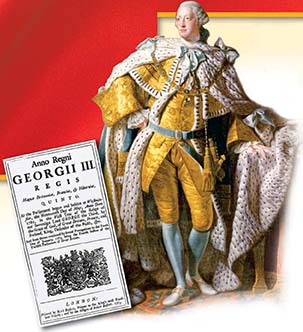SECTION 1: Causes of the Revolution

◄ George III, the king of England
A copy of the Stamp Act ►
WITNESS HISTORY  AUDIO
AUDIO
Rights of the Colonists
James Otis, a leading patriot, argued that British taxes threatened colonists’ rights and would make them slaves to the king and Parliament.
“I can see no reason to doubt but the imposition of taxes … in the colonies is absolutely irreconcilable with the rights of the colonists as British subjects and as men….
We all think ourselves happy under Great Britain. We love, esteem, and reverence our mother country, and adore our King. And could the choice of independency be offered the colonies or subjection to Great Britain upon any terms above absolute slavery, I am convinced they would accept the latter.”
—James Otis, from The Rights of the British Colonies Asserted and Proved, 1763
Objectives
- Describe the colonists’ political heritage.
- Explain the colonists’ reaction to new taxes.
- Describe the methods the colonists used to protest British taxes.
- Understand the significance of the First Continental Congress in 1774.
Terms and People
- Stamp Act
- John Adams
- Patrick Henry
- Sons of Liberty
- nonimportation agreement
- Boston Massacre
- committee of correspondence
- Boston Tea Party
- Intolerable Acts
- First Continental Congress
NoteTaking
Reading Skill: Recognize Sequence Record the events that increased tension between Britain and its colonies.
Why It Matters The American colonists enjoyed the protection of Britain during the Indian wars while paying very little of the cost. Meanwhile, they profited from trade within the British Empire. Most importantly, they cherished the political rights they enjoyed as British subjects. When Parliament began to tax the colonists to raise revenue, they protested. Eventually, the protests turned to rebellion and rebellion turned to war. Section Focus Question: What caused the colonists to rebel against the British?
The Colonists’ Political Heritage
The colonists believed that Great Britain enjoyed the best government on Earth. British liberty included the due process of the common law, trial by jury, and freedom of the press from prior censorship. Above all, the colonists cherished the right to pay no tax unless it was levied by their representatives. Colonial governments followed the British model, but the colonists’ protests of the 1760s revealed that there were some important differences.
British Government Is a Model
The British government had three branches. Executive power belonged to the monarch. Legislative power was divided between two houses of Parliament: the House of Lords and the House of Commons. Aristocrats inherited seats in the House of Lords. Only the House of Commons depended on elections by a small percentage of the people.





